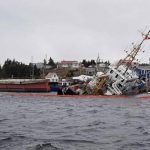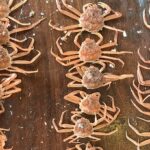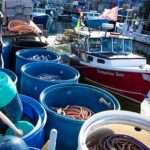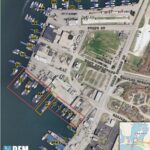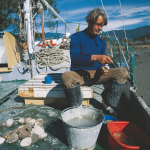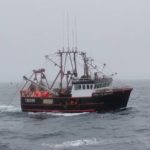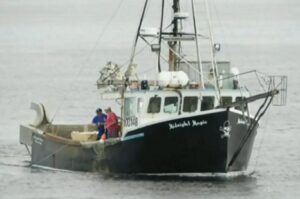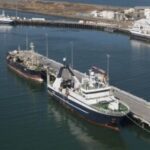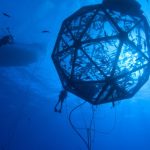Tag Archives: canada
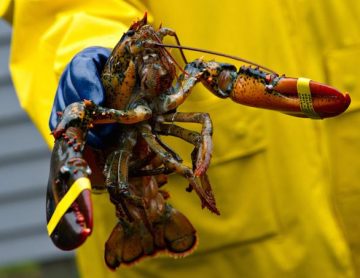
Daunting task begins: Reducing lobster gear to save whales
The interstate Atlantic States Marine Fisheries Commission met Monday outside Washington to discuss the implementation of the new rules, which are designed to reduce serious injuries and deaths among whales by 60 percent.,,, The interstate Atlantic States Marine Fisheries Commission met Monday outside Washington to discuss the implementation of the new rules,,,, Colleen Coogan, who coordinates the federal government team designed to protect the whales, said during the meeting that cooperating with Canadian authorities is also going to be very important. “We’ve set a pretty high bar,” Coogan said. “They’re going to have to show that their measures provide similar protections to right whales.” >click to read<08:58
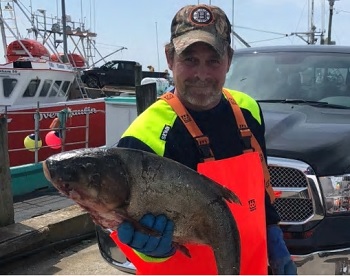
Canada closer to allowing Asian carp as lobster bait, depending on test outcomes
The Canadian Food Inspection Agency says it is prepared to accept invasive Asian carp from the United States as bait for the lobster industry, provided U.S. authorities can meet a number of conditions including proof the carcasses pose no disease threat. “If the U.S. can meet these requirements, Canada is willing to accept the import of dead, eviscerated silver carp for use as bait,” CFIA spokesperson Brian Naud said in a statement. There is interest in both countries in using Asian carp to supply their respective lobster fisheries which are experiencing a bait shortage as traditional sources decline: herring in the United States and mackerel in Canada. The state of Maine is poised to make a decision on Asian carp as a bait source by the end of May. >click to read<11:34
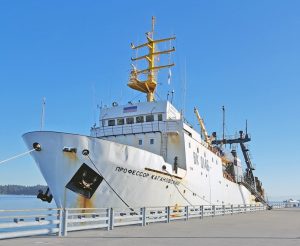
International team of salmon scientists back in port, raring for another mission
The organizer of a month-long Gulf of Alaska salmon survey is already thinking about how to raise money for another trip in the winter of 2020, now that the Russian trawler used in the expedition has finished its job and tied up in Nanaimo. “From what I’ve seen, this needs to be done again,” said Richard Beamish, who came up with the idea of the expedition to mark the International Year of the Salmon with the North Pacific Anadromous Fish Commission. Future surveys would build on data collected by the 21-member volunteer team of international scientists from the five salmon-producing Pacific Rim countries: Canada, Russia, the U.S., Korea and Japan. >click to read<11:52
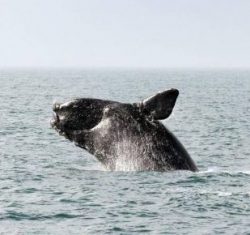
U.S. Marine Mammal Protection Act regulations could impact Canadian fishers
While there were no active harvesters at the Department of Fisheries and Oceans (DFO) public meeting on Thursday, Feb. 28, at the Clarenville Inn, the resource managers still discussed two topics which will affect fishers in the future — the United States’ marine mammal protection act and potential fishery monitoring policies. DFO resource manager Jackie Kean explained the United States Marine Mammal Protection Act is nothing new, it’s been around since the 1970s. However, DFO made clear that all countries who export to the U.S.A. must meet their requirements for marine mammal bycatch while fishing various species in local waters. >click to read<18:33
B.C.-led international expedition to probe ailing Pacific salmon stocks
An unprecedented international collaboration could revolutionize salmon science and fisheries management, return forecasting and even hatchery output. Nineteen scientists from Russia, Canada, the United States, Japan and South Korea are set to probe the secret lives of five Pacific salmon species with a four-week grid search and test fishery across the Gulf of Alaska. The expedition begins next week aboard the Russian research ship MV Professor Kaganovsky. “We know virtually nothing about what happens to salmon once they leave near-shore waters in the Salish Sea,” said expedition organizer Dick Beamish. >click to read<13:56
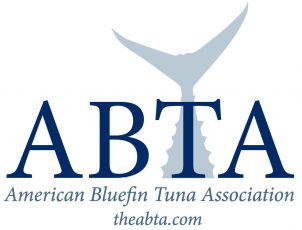
ICCAT Meeting Ends After ‘Spectacular Failure’ to Protect Bigeye Tuna
The International Commission for the Conservation of Atlantic Tunas (ICCAT) concluded its annual plenary meeting on November 19 after a spectacular failure to arrive to a comprehensive agreement on badly needed management measures to address the present poor state of Atlantic bigeye tuna stock. Bigeye tuna is highly coveted by sashimi markets worldwide, similar to bluefin tuna. ICCAT’s eight-day meeting, held this year in Dubrovnik, Croatia, was attended by over 700 people representing 52 countries. The U.S., Canada, South Africa and a handful of other nations strongly advocated for the adoption of measures that would end overfishing immediately and rebuild the stock within 10 years. However, >click to read<20:21
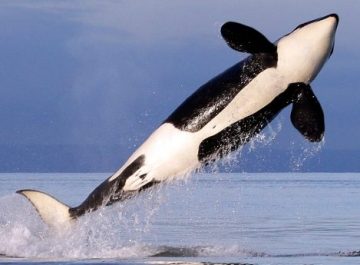
$1.5 billion Oceans Protection Plan – Canada takes immediate action to protect endangered whales
Today, Canada’s Whales Initiative was announced in Vancouver by the Honourable Marc Garneau, Minister of Transport, and Jonathan Wilkinson, Parliamentary Secretary to the Minister of Environment and Climate Change. This $167.4 million initiative under Budget 2018 will protect and support the recovery of the Southern Resident Killer Whale, the North Atlantic right whale, and the St. Lawrence Estuary beluga whale through comprehensive actions tailored to address the unique combinations of threats. >click to read<13:02

Federal carbon tax could ‘degrade’ Canadian fishing industry’s competitiveness
The federal government’s carbon tax could take a toll on Canada’s fishing industry, causing its competitiveness to “degrade relative to other nations,” according to an analysis from the fisheries department.,, According to the analysis, the fishing sector would need to absorb annual fuel cost increases of 2.1 per cent, or $5.2 million, under a carbon price that increases by $10 per tonne annually to $50 per tonne in 2022. The commercial fishing sector would be hardest hit, it finds, as fuel costs account for more than nine per cent of production costs. >click to read<
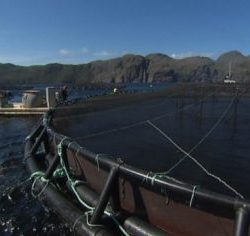
Audit finds Canada’s federal government fumbling on fish farms
The federal government is fumbling the management of fish farms, while failing to enforce rules and manage risks of infectious diseases, parasites, drugs and pesticides that cause damage to wild fish, says a scathing audit released on Tuesday. The audit was one of three reports tabled on Tuesday in the House of Commons by Julie Gelfand, Canada’s commissioner of the environment and sustainable development. It sounds alarms about Canada’s fish farms on Canada’s coasts while questioning the effectiveness of about $30 million in annual government spending to oversee the $1-billion industry. >click to read<11:47
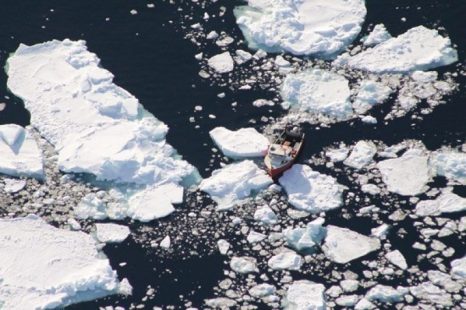
The hunt Canada loves: Why seal clubbing will never die (It’s more humane than most opponents think)
It’s sealing season once again in Canada. This means that, once again, activists are out in strength to decry Canadians as baby-killers and, in some cases, ISIS. And on Tuesday, Canada’s strained relationship with India got just a bit worse when India banned the import of seal skins (although, for obvious reasons, they were never a major seal skin market). Below, a quick guide to the one of the world’s most embattled hunts. What’s true, what’s a myth and why Canadians will never, ever stop doing this. >click to read<09:18
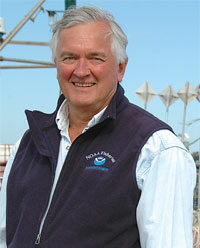
John Bullard: Lobster industry must lead on right whales
A NUMBER OF EVENTS over the past two weeks have probably gotten the full attention of the US lobster industry and increased pressure for it to take the lead in fighting the potential extinction of the North Atlantic right whale. In response to the deaths of the endangered whale, including 12 in Canada last year, Canada has imposed new restrictions on ship speeds and snow crab fishing, as well as earmarked $1 million more annually to help free marine mammals from fishing gear. >click to read<12:03
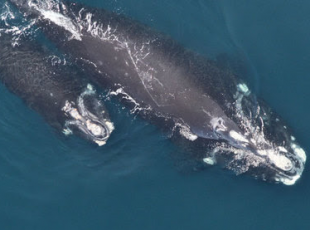
Right whale deaths spur regulators to eye fishing gear modifications
This has been a tough year for North Atlantic right whales. Late in October, according to the International Fund for Animal Welfare, the badly decomposed carcass of a right whale was found ashore on Nashawena Island, south of Cape Cod in Massachusetts. It was the 16th of the highly endangered species known to have died in U.S. or Canadian waters in 2017. Starting in the early spring and continuing through the late summer months, a dozen dead right whales were found floating in Canada’s Gulf of St. Lawrence.,,, Last year, the NOAA Fisheries Large Whale Take Reduction Team (TRT) began a five-year review click here to read the story 08:23
Enviro Groups Demand U.S., Canada Act to Save North Atlantic Right Whales
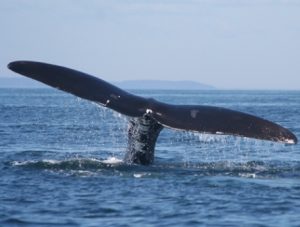 Conservation and animal-protection groups today sought action by the United States and Canada to prevent painful, deadly entanglements in fishing gear that threaten the critically endangered North Atlantic right whale. In letters to Canadian officials and the U.S. National Marine Fisheries Service, the groups demanded action to reduce risks to these imperiled whales. North Atlantic right whales, one of the world’s most endangered mammals with fewer than 500 individual animals remaining on Earth, lost nearly 3 percent of their population this year. click here to read the story 14:00
Conservation and animal-protection groups today sought action by the United States and Canada to prevent painful, deadly entanglements in fishing gear that threaten the critically endangered North Atlantic right whale. In letters to Canadian officials and the U.S. National Marine Fisheries Service, the groups demanded action to reduce risks to these imperiled whales. North Atlantic right whales, one of the world’s most endangered mammals with fewer than 500 individual animals remaining on Earth, lost nearly 3 percent of their population this year. click here to read the story 14:00
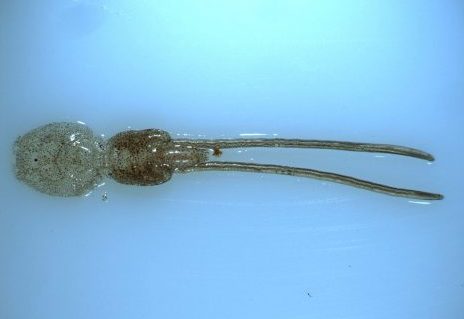
Parasitic sea lice plagues global farmed salmon industry
A surge of parasitic sea lice is disrupting salmon farms around the world. The tiny lice attach themselves to salmon and feed on them, killing or rendering them unsuitable for dinner tables. The lice are actually tiny crustaceans that have infested salmon farms in the U.S., Canada, Scotland, Norway and Chile, major suppliers of the high-protein, heart-healthy fish. Scientists and fish farmers are working on new ways to control the pests, which Fish Farmer Magazine stated last year costs the global aquaculture industry about $1 billion annually. click here to read the story 20:26
King fishery closed
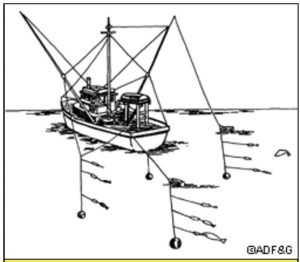 Fisheries managers in Southcentral Alaska might still be wrestling with what to do about a weak return of king salmon to the Copper River, but their counterparts in Southeast Alaska have acted to protect kings returning to the Taku and Stikine Rivers. Officials with the Alaska Department of Fish and Game today announced commercial troll fisheries which catch most of the Southeast kings, or Chinook as they are otherwise called will close at midnight Sunday. Preseason forecasts for wild Chinook salmon production in Southeast Alaska are at an all-time low, a press release said. Typically, in the Taku and Stikine rivers, nearly half the run has entered the river by the end of the third week of May; however, record low numbers of Chinook salmon are being seen in-river this year. The Taku and Stikine are transboundary rivers, and Fish and Game runs research programs with the Department of Fisheries and Oceans Canada to assess in-season run strength. Click here to read the story 13:13
Fisheries managers in Southcentral Alaska might still be wrestling with what to do about a weak return of king salmon to the Copper River, but their counterparts in Southeast Alaska have acted to protect kings returning to the Taku and Stikine Rivers. Officials with the Alaska Department of Fish and Game today announced commercial troll fisheries which catch most of the Southeast kings, or Chinook as they are otherwise called will close at midnight Sunday. Preseason forecasts for wild Chinook salmon production in Southeast Alaska are at an all-time low, a press release said. Typically, in the Taku and Stikine rivers, nearly half the run has entered the river by the end of the third week of May; however, record low numbers of Chinook salmon are being seen in-river this year. The Taku and Stikine are transboundary rivers, and Fish and Game runs research programs with the Department of Fisheries and Oceans Canada to assess in-season run strength. Click here to read the story 13:13
Area of Interest – Canada Identifies Large Ocean Area off the Coast of British Columbia for Protection
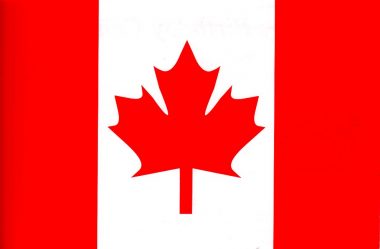 The Government of Canada is moving forward on its plan to reach its domestic and international targets of protecting 5% of Canada’s marine and coastal areas by 2017 and 10% by 2020 to ensure a healthy environment and economy for current and future generations. Today, Parliamentary Secretary to the Minister of Fisheries, Oceans and the Canadian Coast Guard and Member of Parliament for Burnaby North – Seymour, Terry Beech, on the behalf of the Honourable Dominic LeBlanc, Minister of Fisheries, Oceans and the Canadian Coast Guard, announced a new Area of Interest (AOI) off the coast of British Columbia, with the intention of making it one of Canada’s largest Marine Protected Areas (MPAs) by 2020. click here to read the press release 17:09
The Government of Canada is moving forward on its plan to reach its domestic and international targets of protecting 5% of Canada’s marine and coastal areas by 2017 and 10% by 2020 to ensure a healthy environment and economy for current and future generations. Today, Parliamentary Secretary to the Minister of Fisheries, Oceans and the Canadian Coast Guard and Member of Parliament for Burnaby North – Seymour, Terry Beech, on the behalf of the Honourable Dominic LeBlanc, Minister of Fisheries, Oceans and the Canadian Coast Guard, announced a new Area of Interest (AOI) off the coast of British Columbia, with the intention of making it one of Canada’s largest Marine Protected Areas (MPAs) by 2020. click here to read the press release 17:09
Canada’s opening stance for NAFTA talks: Common ground, not confrontation
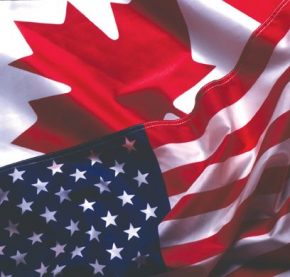 The Canadian government is signalling the approach it intends to take should Donald Trump make good on his promise to renegotiate the North American Free Trade Agreement. Canada’s ambassador to the U.S. is laying out some starting principles such as co-operation instead of confrontation. In a lengthy interview, David MacNaughton expressed his desire to see the countries propose common-ground, common-sense ideas that improve the old agreement instead of flinging out hardball demands that could produce deep, drama-filled bargaining. “We have done an extensive amount of work (to prepare for this),” MacNaughton said in the year-end interview. “We have a good sense of what would be in Canada’s interest…. “(But) the areas we need to focus on — and I think we are focusing on — is where is it not just in Canada’s interest, but in Canada and the United States’ interest… “I think if we’re just blatantly trying to push something that works for us but doesn’t work for them, that’s not going to be… quite as easy.” Read the rest here 17:41
The Canadian government is signalling the approach it intends to take should Donald Trump make good on his promise to renegotiate the North American Free Trade Agreement. Canada’s ambassador to the U.S. is laying out some starting principles such as co-operation instead of confrontation. In a lengthy interview, David MacNaughton expressed his desire to see the countries propose common-ground, common-sense ideas that improve the old agreement instead of flinging out hardball demands that could produce deep, drama-filled bargaining. “We have done an extensive amount of work (to prepare for this),” MacNaughton said in the year-end interview. “We have a good sense of what would be in Canada’s interest…. “(But) the areas we need to focus on — and I think we are focusing on — is where is it not just in Canada’s interest, but in Canada and the United States’ interest… “I think if we’re just blatantly trying to push something that works for us but doesn’t work for them, that’s not going to be… quite as easy.” Read the rest here 17:41
Government of Canada is consulting on New Proposed Marine Protected Area
 Canada is taking action to protect marine biodiversity, ecosystem function and special natural features by proposing St. Anns Bank in Nova Scotia as a Marine Protected Area (MPA) under Canada’s Oceans Act. The Honourable Dominic LeBlanc, Minister of Fisheries, Oceans and the Canadian Coast Guard, announced today the launch of a 45-day public consultation period that ends January 31, 2017, as part of the pre-publication of the proposed regulations in Canada Gazette Part I. The Government of Canada will consider comments provided by the public during the consultation period to formulate the final regulations that will establish and govern the new MPA. The work supporting the proposed MPA has been a collaboration with the St. Anns Bank Stakeholder Advisory Committee, composed of representatives from industry, academia, environmental non-government organizations, provincial and federal government regulators, First Nations and Indigenous organizations. The Advisory Committee participated in the development of the conservation objectives and the delineation of the MPA boundary and zones. Read the rest here 11:59
Canada is taking action to protect marine biodiversity, ecosystem function and special natural features by proposing St. Anns Bank in Nova Scotia as a Marine Protected Area (MPA) under Canada’s Oceans Act. The Honourable Dominic LeBlanc, Minister of Fisheries, Oceans and the Canadian Coast Guard, announced today the launch of a 45-day public consultation period that ends January 31, 2017, as part of the pre-publication of the proposed regulations in Canada Gazette Part I. The Government of Canada will consider comments provided by the public during the consultation period to formulate the final regulations that will establish and govern the new MPA. The work supporting the proposed MPA has been a collaboration with the St. Anns Bank Stakeholder Advisory Committee, composed of representatives from industry, academia, environmental non-government organizations, provincial and federal government regulators, First Nations and Indigenous organizations. The Advisory Committee participated in the development of the conservation objectives and the delineation of the MPA boundary and zones. Read the rest here 11:59
Sweden’s lobster game; stick to soccer
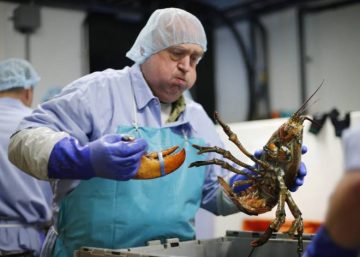 Legendary American soccer goalie Hope Solo was rightly suspended for calling the Swedish national team a “bunch of cowards” after the European side beat the U.S. women’s team in the Rio Olympics last month. Playing the more talented and explosive American side, Sweden played a crafty, intelligent, defensive game for 120 minutes. The result was a scoreless tie after regulation and extra time. The Swedes won the shootout that followed. Today, Nova Scotia’s lobster fishermen may be feeling some sympathy for Solo. For Sweden is clearly playing a defensive game as it attempts to get the European Union to ban imported lobsters from Canada and the United States (which for the most part means Nova Scotia and Maine). Read the Op-ed here 11:12
Legendary American soccer goalie Hope Solo was rightly suspended for calling the Swedish national team a “bunch of cowards” after the European side beat the U.S. women’s team in the Rio Olympics last month. Playing the more talented and explosive American side, Sweden played a crafty, intelligent, defensive game for 120 minutes. The result was a scoreless tie after regulation and extra time. The Swedes won the shootout that followed. Today, Nova Scotia’s lobster fishermen may be feeling some sympathy for Solo. For Sweden is clearly playing a defensive game as it attempts to get the European Union to ban imported lobsters from Canada and the United States (which for the most part means Nova Scotia and Maine). Read the Op-ed here 11:12
US and Canada reject Sweden’s call for lobster ban
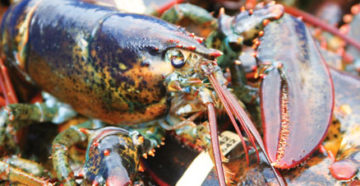 Canada and the United States on Monday rejected Swedish calls for a ban on imports of live American lobsters, saying fears of an invasive species displacing its European cousin are unsubstantiated. Speaking for both countries, Steven Wilson, a deputy director of the National Oceanic and Atmospheric Administration (NOAA), told a news conference that Swedes had “found some evidence that there are lobsters in their waters”. “But those lobsters could not thrive and could not rise to a population that could either pass disease or overcome the native species,” he said. Current evidence points only to lobsters escaping, not a full blown invasion, he added. “There just isn’t enough scientific information that gives you the impression that this is something that could take hold , which is important in the invasive-species standard internationally,” Read the rest here 11:24
Canada and the United States on Monday rejected Swedish calls for a ban on imports of live American lobsters, saying fears of an invasive species displacing its European cousin are unsubstantiated. Speaking for both countries, Steven Wilson, a deputy director of the National Oceanic and Atmospheric Administration (NOAA), told a news conference that Swedes had “found some evidence that there are lobsters in their waters”. “But those lobsters could not thrive and could not rise to a population that could either pass disease or overcome the native species,” he said. Current evidence points only to lobsters escaping, not a full blown invasion, he added. “There just isn’t enough scientific information that gives you the impression that this is something that could take hold , which is important in the invasive-species standard internationally,” Read the rest here 11:24
Canada approves genetically modified salmon for sale to public
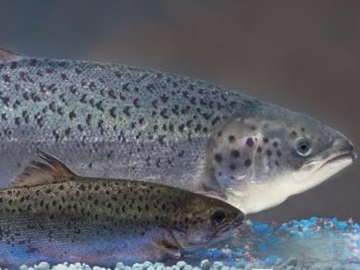 Canadian grocery stores have received the regulatory green light to begin selling fast-growing, genetically modified salmon – the first such species to gain such approval from federal agencies. Health Canada and the Canadian Food Inspection Agency announced Thursday they had completed a scientific review of AquAdvantage’s salmon and it has passed the final regulatory hurdle for the farmed fish. The fish was developed by U.S.-based biotechnology firm AquaBounty Technologies Inc. to promote rapid growth of the fish during early life, using a growth hormone gene from the Chinook salmon in an Atlantic salmon. The company has one facility in Canada, in Bay Fortune, P.E.I., and a production centre in Panama. Dave Conley, a spokesman for the firm, said in an email that it will be a year or more before the firm has any production of market-sized fish. Read the rest here 18:53
Canadian grocery stores have received the regulatory green light to begin selling fast-growing, genetically modified salmon – the first such species to gain such approval from federal agencies. Health Canada and the Canadian Food Inspection Agency announced Thursday they had completed a scientific review of AquAdvantage’s salmon and it has passed the final regulatory hurdle for the farmed fish. The fish was developed by U.S.-based biotechnology firm AquaBounty Technologies Inc. to promote rapid growth of the fish during early life, using a growth hormone gene from the Chinook salmon in an Atlantic salmon. The company has one facility in Canada, in Bay Fortune, P.E.I., and a production centre in Panama. Dave Conley, a spokesman for the firm, said in an email that it will be a year or more before the firm has any production of market-sized fish. Read the rest here 18:53
Exclusive: Canada fisheries protest US-proposed IUU Fishing Enforcement Act Import Rules
 Fisheries in Canada and other countries are protesting new efforts by United States to curb illegal, unreported and unregulated (IUU) imports, arguing they already have documentation and other good fisheries management measures that are required in the new regulations and should not be required to go through the time and expense required to comply. Following the passage into law of the Illegal, Unreported and Unregulated Fishing Enforcement Act, which was approved unanimously by the U.S. Congress and signed by President Obama in 2015, the National Atmospheric and Oceanic Administration (NOAA) is seeking to align its rules regarding permitting and reporting requirements “to provide for traceability of seafood products offered for entry into the U.S. supply chain, and to ensure that these products were lawfully acquired,” Read the rest here 19:02
Fisheries in Canada and other countries are protesting new efforts by United States to curb illegal, unreported and unregulated (IUU) imports, arguing they already have documentation and other good fisheries management measures that are required in the new regulations and should not be required to go through the time and expense required to comply. Following the passage into law of the Illegal, Unreported and Unregulated Fishing Enforcement Act, which was approved unanimously by the U.S. Congress and signed by President Obama in 2015, the National Atmospheric and Oceanic Administration (NOAA) is seeking to align its rules regarding permitting and reporting requirements “to provide for traceability of seafood products offered for entry into the U.S. supply chain, and to ensure that these products were lawfully acquired,” Read the rest here 19:02
U.S. Coast Guard Unveils a New Model for Cooperation Atop the World
 The United States Coast Guard announced Friday the creation of a new international forum for cooperation in the Arctic. Signed at the United States Coast Guard Academy in New London, Connecticut, the new Arctic Coast Guard Forum will include coast guards or similar agencies from Canada, Denmark, Finland, Iceland, Norway, Sweden, Russia and the United States. “Today’s historic Arctic Coast Guard Forum represents a critical step forward in our collective efforts to promote safety, security and environmentally responsible maritime activity in the Arctic,” said Coast Guard Commandant Admiral Paul Zukunft. Read the rest here 10:50
The United States Coast Guard announced Friday the creation of a new international forum for cooperation in the Arctic. Signed at the United States Coast Guard Academy in New London, Connecticut, the new Arctic Coast Guard Forum will include coast guards or similar agencies from Canada, Denmark, Finland, Iceland, Norway, Sweden, Russia and the United States. “Today’s historic Arctic Coast Guard Forum represents a critical step forward in our collective efforts to promote safety, security and environmentally responsible maritime activity in the Arctic,” said Coast Guard Commandant Admiral Paul Zukunft. Read the rest here 10:50
Canada appears poised to sign international Arctic fish deal
“We can confirm that we are planning to attend a meeting in Norway with other 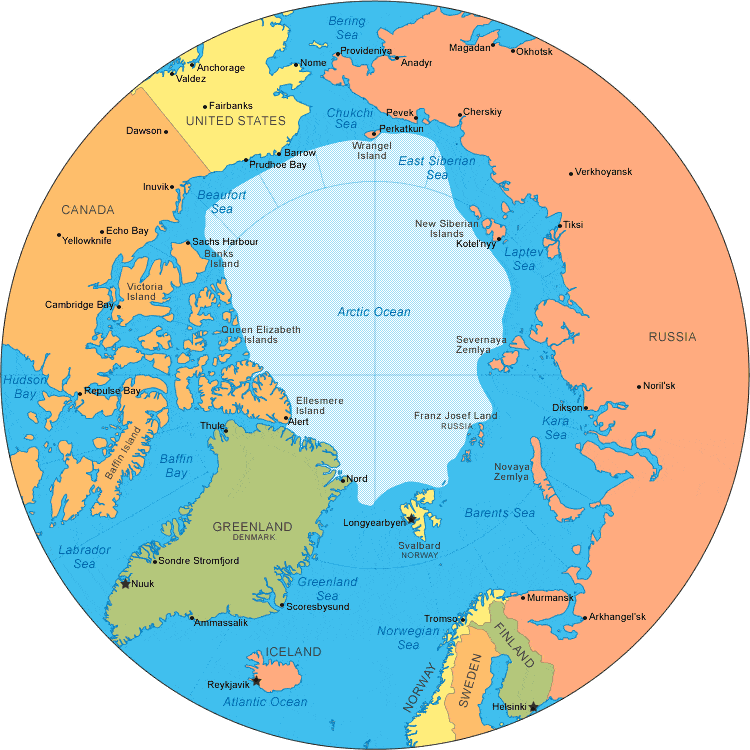 coastal states to discuss further measures against unregulated high-seas fishing in the central Arctic Ocean,” Carole Saindon wrote in an email.”Details of the results of those discussions will be released at the conclusion of the meeting.”Canada, the United States, Russia, Denmark and Norway reached an interim agreement in February 2014 to work toward protecting Arctic waters beyond the 200-kilometre territorial limit of their respective shores, an area the size of the Mediterranean Sea. Read the rest here 08:11
coastal states to discuss further measures against unregulated high-seas fishing in the central Arctic Ocean,” Carole Saindon wrote in an email.”Details of the results of those discussions will be released at the conclusion of the meeting.”Canada, the United States, Russia, Denmark and Norway reached an interim agreement in February 2014 to work toward protecting Arctic waters beyond the 200-kilometre territorial limit of their respective shores, an area the size of the Mediterranean Sea. Read the rest here 08:11
Atlantic Salmon Federation calling on Greenland to end commercial fishery of Atlantic salmon
Fishermen and conservationists are urging Greenland to end its commercial fishery of  , arguing the stock is at historic lows and won’t recover if the harvest continues. It says that even though the population has been steadily declining over the last several years, Greenland has maintained its factory fishery of salmon that migrate north from river systems in Canada, the United States and elsewhere. The group released the figures ahead of a critical meeting next week in Labrador,,, Read the rest here 14:55
, arguing the stock is at historic lows and won’t recover if the harvest continues. It says that even though the population has been steadily declining over the last several years, Greenland has maintained its factory fishery of salmon that migrate north from river systems in Canada, the United States and elsewhere. The group released the figures ahead of a critical meeting next week in Labrador,,, Read the rest here 14:55
The Future of Fishing in the Central Arctic
 Increasingly, it’s the future of fisheries that is taking center stage in the geopolitical discussions that come with planning for the future Arctic. This was made evident on January 15 and 16, 2015, when 40 Arctic experts from the United States, Canada, Russia, China, Iceland, Denmark, and Greenland travelled to Tongji University in Shanghai to attend the first “Roundtable on Central Arctic Ocean Fisheries Issues.” Read the rest here 18:21
Increasingly, it’s the future of fisheries that is taking center stage in the geopolitical discussions that come with planning for the future Arctic. This was made evident on January 15 and 16, 2015, when 40 Arctic experts from the United States, Canada, Russia, China, Iceland, Denmark, and Greenland travelled to Tongji University in Shanghai to attend the first “Roundtable on Central Arctic Ocean Fisheries Issues.” Read the rest here 18:21
Alexandra Morton: Canada is changing its laws for dirty salmon
 On the January 10, 2015, hurricane-force winds hit the coast of Norway. Over 100,000 farm fish escaped during the storm, including 63,000 North American steelhead. Sport fishermen, furious that these foreign fish were teeming through the fjords near Bergen, set to work recapturing the oddly disfigured steelhead. They sent samples to a lab at the University of Bergen, where their fears were confirmed. The farm fish were positive for a suite of farm viruses. Read the rest here 20:37
On the January 10, 2015, hurricane-force winds hit the coast of Norway. Over 100,000 farm fish escaped during the storm, including 63,000 North American steelhead. Sport fishermen, furious that these foreign fish were teeming through the fjords near Bergen, set to work recapturing the oddly disfigured steelhead. They sent samples to a lab at the University of Bergen, where their fears were confirmed. The farm fish were positive for a suite of farm viruses. Read the rest here 20:37






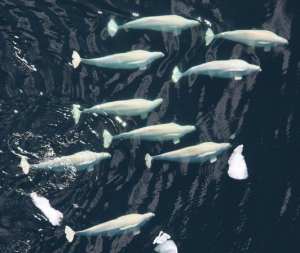

 In its proposed regulatory changes to the Fisheries Act, the Harper government is not only catering to the Norwegian-based multinational fish-farm industry in Canada, it is also collaborating with the U.S. government in little-known efforts to “harmonize” regulations across many sectors, including the aquaculture industry. The results could have devastating impacts on Canada’s ocean environment, wild fish, and our fishing industries.
In its proposed regulatory changes to the Fisheries Act, the Harper government is not only catering to the Norwegian-based multinational fish-farm industry in Canada, it is also collaborating with the U.S. government in little-known efforts to “harmonize” regulations across many sectors, including the aquaculture industry. The results could have devastating impacts on Canada’s ocean environment, wild fish, and our fishing industries. 


























